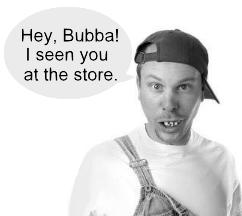 
If you graduated from high school you should have a basic understanding of how the English language works. You should be capable of writing and speaking coherently, without making errors. This is especially true if you're a parent of young kids, or your job has you anywhere near the education system. If you consistently make these common errors as an educated adult, you should be ashamed!  1. Seen
1. SeenThe error is in using 'seen' when the word should be 'saw', as in "I seen the dog on the road" rather than "I saw the dog on the road". Using 'seen' this way makes you sound like a hillbilly, and you need to just stop doing it! 2. Youse If you say "All of youse kids need to sit down", you should be very embarrassed. 'Youse' is not a word. It makes you sound even more ignorant that using 'ain't'. The correct usage is "All of you kids need to sit down." [Or if you're from the South, possibly "All y'all need to sit down". lol] 3. Your/You’re Mixing up these words is just inexcuseable laziness. 'Your' is an adjective, used to describe something that's yours or something about you, as in "I like your hair". 'You're' is a contraction that's short for 'you are', as in "You're going to the party with me." 4. Misplacing Apostrophes You may find apostrophes a little tricky, but once you follow the rules, it will become easy. Putting an apostrophe in the wrong place is a common mistake. Rules: Apostrophes indicate something belongs to something or is owned by someone else. To show that something belongs to one person, place the apostrophe before the letter ‘s.’ For example – “The girl’s sheep”. To show that something belongs to more than one person, you need to place the apostrophe after the letter ‘s’. For example – “The girls’ house”. (where more than one girl is living in the house) Apostrophes are also used in contracted words, such as “can’t” to indicate that the ‘o’ is missing from “cannot.” Apostrophes should never be used to make a word plural. For example: "The three dogs' were chasing me" is wrong. 5. There / Their / They're These are homophones, and they're used differently. Rules: Here is how not to use these words: -Their going to be here soon. (should be "they're") - We should contact they’re friend. (should be "their") - Can we use there house? (should be "their") - They’re is is an argument that says... (should be "there") 6. Double Subjects in a Sentence Here's are some examples: - "The bus driver, he told me that the prices have gone up." - "My friend Sheila, she gave me this bracelet." The pronouns "he" and "she" don't have to be there, since both sentences have subjects. "The bus driver told me that the prices have gone up." and "My friend Sheila gave me this bracelet." 7. Using "Like" Inappropriately This is mostly an error made when speaking. Don't ever talk this way in a job interview: "I was, like, on my way here, and I really, like, needed a coffee, so I, like, stopped at Starbucks, like, just for five minutes. Like, you know?" People will think you're, like, an idiot! 8. Using "Done" Instead of "Did" "I done the dishes before I went to bed." Be ashamed. Be very ashamed! One definition of literacy is the ability to write without errors. Using this definition implies that if you can't write a paragraph about something that is free of spelling, grammar and punctuation errors, then you are functionally illiterate. |